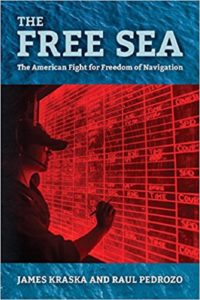Podcast: Play in new window | Download
Subscribe: RSS
 James Kraska was a Judge Advocate General for the US Navy and has extensive experience on defense issues and Freedom of Navigation issues. He’s currently a visiting Professor of Law at the Naval War College. He has co-authored a book on the history of US enforcement of Freedom of Navigation and we spoke about the book.
James Kraska was a Judge Advocate General for the US Navy and has extensive experience on defense issues and Freedom of Navigation issues. He’s currently a visiting Professor of Law at the Naval War College. He has co-authored a book on the history of US enforcement of Freedom of Navigation and we spoke about the book.
1:56 – Professor. Kraska was a Navy Judge Advocate lawyer and in this capacity he learned and practiced the law regarding Freedom of Navigation. He taught at the Naval War College and completed a degree on the subject. Raul Pedroza, the other author, is also a retired Navy JAG and a professor of law.
3:55 – It has been imperative for the US to protect the sea for economic and security purposes. The book is a mix of history and law on Freedom of Navigation. The book starts with the Quasi-War with France and continues all the way through the current Chinese attempts to assert unlawful control of regional seas.
6:55 – The US defends Freedom of Navigation globally because no one else will do it. Many countries depend on the US to maintain order at sea. The Dutch enforced freedom of the seas in the 1500s and then the British took over enforcing these global rights.
8:57 – The US took over from the British around the 1880s. By 1945, the US had fully assumed the role of protecting freedom of the seas.
11:00 – Freedom of navigation is a continuous struggle to maintain these freedoms. The Gulf of Tonkin and Pueblo incidents are examples of violent conflict involving freedom of navigation.
12:37 – Political will and military capability are needed to maintain freedom of navigation. Territorial seas are part of the global commons. The US has operated on territorial seas and also on high seas to protect navigation freedoms. Surveillance aircraft are also used to maintain freedom of navigation on the seas.
17:31 – Using international airspace to protect the seas has been developing for the last hundred years. The International Civil Aviation organization also supports airspace use to protect Freedom of Navigation.
19:00 – The threat of piracy greatly declined by the 20th century as states have cohered into stronger entities. Piracy existed around Somalia because it was a failed state. Before the Treaty of Paris in 1856, many states used privateers to attack enemy shipping. After the treaty, states agreed to stop using privateers. Since then, threats to freedom of navigation come from nation states.
21:40 – Chinese actions now are the greatest threats to freedom of navigation since Germany’s U-boat wars. During the Cold War, the US and Soviet Union worked in tandem to preserve navigational freedoms. The Soviet Union needed it more than the US due to the location of their bases. China wants to undo parts of the international agreements on freedom of navigation and keep others out of the waters close to their territory. They want to dominate the seas within the first island chain including the South China Sea and the East China Sea.
27:56 – During WWII, Japan wanted to control the seas around East Asia through war. China is trying to achieve the same goal but through a “Finlandization” of its neighbors. China has used fishing claims to try to assert control in these areas but that doesn’t work within the existing international agreements.
32:57 – The main focus of the book is that freedom of the seas is not a condition that [exists] can exist without promotion and protection. If the US stops exercising rights over global seas, then these rights will erode for all nations.
34:45 – Wilson called for a protection of freedom of navigation by all nations and for all nations. Roosevelt also insisted on maintaining these global rights. A group of united nations met during WWII to maintain rights and later they met after the war to form the United Nations.
37:27 – Both authors have extensive experience in this field especially for events over the last 15 years and beyond. They used CIA archives and presidential libraries to do some research.
39:00 – Washington saw the US as a liberal actor that supported all nations and conducted trade with all as well. But European politics continued to drag the US into conflict and affected trade.
42:50 – He was most moved by the sacrifices made to protect US interests. John Negroponte made an impassioned speech on freedom of the seas to remind people how much US security depended on freedom of the seas.
44:58 – His next writing project might be on the free seas from the British perspective. He’s also working on a project about Japan’s relationship with sea.
45:35 – Many of his articles are on the SSRN.
Links
For more “Military History Inside Out” please follow me on Facebook at warscholar, on twitter at Warscholar, on youtube at warscholar1945 and on Instagram @crisalvarezswarscholar
Guests: James Kraska
Host: Cris Alvarez
Tags: military, history, military history, conflict, war, interview, non-fiction book, freedom of the seas, freedom of navigation, China, US, Britain, Germany, Japan, East China Sea, South China Sea, Quasi-War, Pueblo incident, WWII
